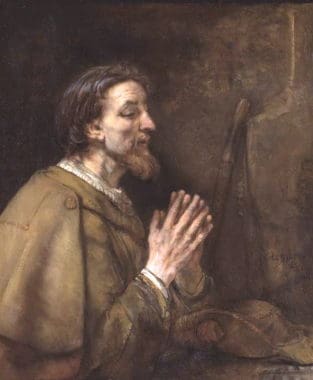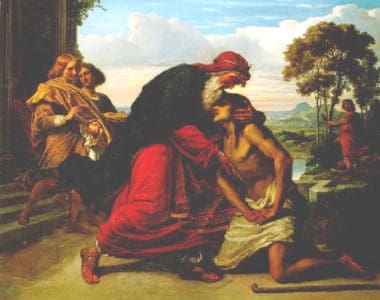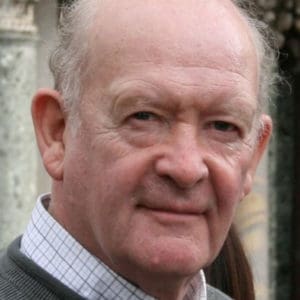Mini-Course on Prayer
Part 9 “FATHER E “- Examination of Conscience
Examination of Conscience and Repentance
Editor’s Note: In Part 8 of this mini-course, David Torkington examined the letters T (thanksgiving) and H (Holy Communion) in his explication of the “OUR FATHER” mnemonic, or memory jog, for keeping God and prayer at the forefront of our lives. Today, he will conclude this portion of his mini-course on prayer with the last two letters E (examination of conscience) and R (repentance).
Even though we may make the Morning Offering as sincerely as possible, and genuinely try to implement it in the forthcoming day, we will ultimately fail unless something is done to cure the scourge of selfishness that can destroy even our best of intentions and our sincerest efforts. That is why in this, my last article of the first part of my series on prayer I want the last two letters of the memory jog – Our Father – to remind us to examine our consciences – E – and to make an act of repentance – R-. God wants us to do all that is within our power to strip away all and everything in our lives that prevents us from being totally united with him at all times. Only then will he be able to possess us as fully as he has planned. If we do not see the sin and the selfishness that prevents our growth in the spiritual life, it is not because we are sinless, it is simply because we are blind and we need to cry out with Bartimaeus, “Lord, that I may see” (Mark 10:46-52).
The most memorable retreats I have ever attended
In the most memorable retreat I have ever attended, Archbishop Anthony Bloom began by telling the story of a retired headmistress who offered her services to him as a chauffeur. As they were returning home one Monday afternoon she stopped the car in Kensington in London to pick up her new spectacles from the opticians and proceeded to try them out for the remainder of the journey. It was less than a mile, but it turned out to be the most terrifying journey either of them ever made; her driving was terrifying. She climbed out of the car shaking all over, opened her handbag, took out her driving licence and ceremoniously ripped it into little pieces. “I’ll never drive again,” she said. “Why ever not?” asked the Archbishop. “Because,” she replied, “there is just so much traffic on the road.” So, if we do not see, it is because we are spiritually blind and need to do something about it.
The holiest man I have ever known
 Whilst working in the Cameroon, I met the holiest man I have ever known. He told me he had been in spiritual darkness for many years. One day he became ill and was admitted to the monastery infirmary where he received Holy Communion each day. On three distinct occasions, just as he was about to receive communion he heard these words, “Only you have been keeping me out.” We are doing exactly the same and that is why the letter -E- in the Our Father is to remind us to examine our conscience each day, to pause for a few moments to review our lives since we last prayed. It is time to ask God to show us everything we have done or failed to do that has kept him out. After this has been done, it is time to make an Act of Contrition for how we have failed in the past. A formal act of contrition could be used, or perhaps the recitation of what came to be called the ‘Jesus Prayer’ said several times over, slowly and prayerfully – “Jesus, Son of God, have mercy on me a sinner”. But, a sincere expression of personal sorrow, in our own words would be better still. Then we could make a firm purpose of amendment, a genuine decision to try and behave better in future.
Whilst working in the Cameroon, I met the holiest man I have ever known. He told me he had been in spiritual darkness for many years. One day he became ill and was admitted to the monastery infirmary where he received Holy Communion each day. On three distinct occasions, just as he was about to receive communion he heard these words, “Only you have been keeping me out.” We are doing exactly the same and that is why the letter -E- in the Our Father is to remind us to examine our conscience each day, to pause for a few moments to review our lives since we last prayed. It is time to ask God to show us everything we have done or failed to do that has kept him out. After this has been done, it is time to make an Act of Contrition for how we have failed in the past. A formal act of contrition could be used, or perhaps the recitation of what came to be called the ‘Jesus Prayer’ said several times over, slowly and prayerfully – “Jesus, Son of God, have mercy on me a sinner”. But, a sincere expression of personal sorrow, in our own words would be better still. Then we could make a firm purpose of amendment, a genuine decision to try and behave better in future.
Finally, as we become a little more aware of the moral stumbling blocks that trip us up, it is time to try and forestall them. If there is a lazy streak in us, or if we have a hot temper, or are prone to making remarks at the expense of others, it is the time to take the necessary steps to avoid falling into these same faults in the forthcoming day. St Paul was the first to realise that it is in fact our very weaknesses, and that even includes our sins, that can become stepping stones to sanctity, if they only convince us of our utter need for God. This is good news, because the truth is, in this life we will never stop falling. “When you stop falling you will be in heaven, but when you stop getting up, you will be in hell” (Peter Calvay).
FATHER R – Repentance
The love that was unleashed by the Risen Christ will never stop being poured out now and for always, but it will only be received by those who choose to turn to receive it, or in the words of St Peter, those who choose to repent. Every Jew knew what it meant to repent; it meant turning back to God, for that is what the word repentance meant throughout the whole of the Old Testament. However, for Jesus this traditional word took on a new meaning. Jesus taught his followers that God was none other than their ever-loving Dad (Abba), and repentance therefore meant turning back to him. It meant turning back to the true home where we were all originally conceived, and to where we will all one day return. The word Shub in Hebrew actually means to return. The prophet Isaiah uses this word as Jesus was to use it later, namely of the return of errant sons back to their Father.  Jesus came from the home where we were all conceived, to take us back with him to live with him in a family bonded together by the love that endlessly surges out of his Father, to enjoy utter, ongoing, and ever-increasing joy to all eternity.
Jesus came from the home where we were all conceived, to take us back with him to live with him in a family bonded together by the love that endlessly surges out of his Father, to enjoy utter, ongoing, and ever-increasing joy to all eternity.
Conversion and Repentance are Not the Same
Many of those who listened to St Peter had an immediate conversion experience. The love that touched the Apostles touched them, and they wanted to change their lives immediately. A conversion experience is one thing, but repentance is quite another. Repentance means turning to receive the love that is forever pouring out of Jesus, not once, but time and time again. How? By relentlessly turning away from all and everything that would impede it, even though this might mean a complete and radical change of life and utter abandonment to God. Yesterday is gone, tomorrow is to come, so it is only now that a person can turn to God to receive the love that is relentlessly pouring out of him, and into us through Jesus. That is why Jean Pierre de Caussade called the present moment a sacrament, because it is only now that we can abandon ourselves to the love of God. The only way to do this, is not by making a grand gesture, as people often do after a conversion experience, but by freely choosing to repent here and now, today and repeatedly every day.
These ideas are developed further in my two major works on prayer – Wisdom from the Western Isles and Wisdom from the Christian Mystics. Wisdom from Franciscan Italy shows how the mystical life is lived by St Francis of Assisi, called in his lifetime, a Second Christ.
Editor’s Note: In part 10, he will discuss the paramount importance of daily prayer and provide a summation of examples of what that prayer might look like.
+
Art for this post on an examination of conscience and repentance: Saint James the Greater, Rembrandt van Rijn, 1661, PD-US author’s life plus 100 years or less; Die Rückkehr des verlorenen Sohns (The Return of the Prodigal Son), Otto Mengelberg, 1848, PD-US author’s life plus 70 years or less; both Wikimedia Commons.




